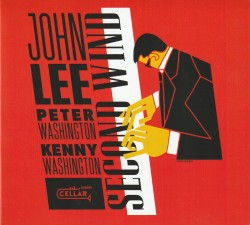Although a rudimentary version of the modern piano was built in the late 17th century, keyboards of some sort go back a few centuries before that, and the polyphonic potential of the keyboard has been of interest since that time. The 21st century has multiplied the number of keyboards and techniques that can be used, with processing, sampling and electronics adding more avenues to explore. While centred on single keyboards of many kinds, each of these discs captures unique variations on this idea and practice.
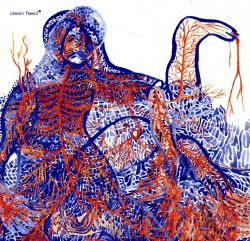 Probably the most traditional of these non-traditional sessions is A Body as Listening (Clean Feed CF 664 CD cleanfeedrecords.bandcamp.com/album/a-body-as-listening) by Portuguese pianist Joana Sá. Adding electronics, samples and objects to her keyboard improvisations she uses the add-ons cannily, never allowing them to supersede the acoustic themes, but allowing them to amplify her playing. From the first notes, which create a careful theme elaboration, her instrumental command means that at the same time as she’s advancing variations with adagio low-pitched echoes and higher pitched prestissimo tinkles, signal processed beeps and peeps become more audible. As a backdrop these intermittent wave forms may permeate the exposition, but never mute advancing new simple melodies. Busier and stinging, the additional sound samples reinforce her strategy of alternating pedal-point pressure, amplified full keyboard crashes and elevated note jangling. Completing the session with A Body as Listening III the narrative includes other timbral deviations, both electronic and acoustic, encompassing foot tapping, forearm keyboard crashes as well as pre-recorded bell-ringing and vocal choir fragments. These outline quieter and more enigmatic piano variations that define this modern modification of a piano concerto.
Probably the most traditional of these non-traditional sessions is A Body as Listening (Clean Feed CF 664 CD cleanfeedrecords.bandcamp.com/album/a-body-as-listening) by Portuguese pianist Joana Sá. Adding electronics, samples and objects to her keyboard improvisations she uses the add-ons cannily, never allowing them to supersede the acoustic themes, but allowing them to amplify her playing. From the first notes, which create a careful theme elaboration, her instrumental command means that at the same time as she’s advancing variations with adagio low-pitched echoes and higher pitched prestissimo tinkles, signal processed beeps and peeps become more audible. As a backdrop these intermittent wave forms may permeate the exposition, but never mute advancing new simple melodies. Busier and stinging, the additional sound samples reinforce her strategy of alternating pedal-point pressure, amplified full keyboard crashes and elevated note jangling. Completing the session with A Body as Listening III the narrative includes other timbral deviations, both electronic and acoustic, encompassing foot tapping, forearm keyboard crashes as well as pre-recorded bell-ringing and vocal choir fragments. These outline quieter and more enigmatic piano variations that define this modern modification of a piano concerto.
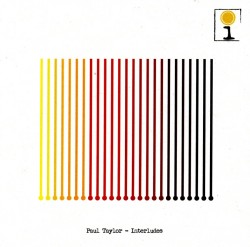 Taking the idea of keyboards as mini orchestras still further, Briton Paul Taylor created a more than 59-minute program for the Newcastle Festival of Jazz and Improvised music with Interludes (New Jazz and Improvised Music NEWJAIm 18 paulstephentaylor.bandcamp.com/album/interludes). The work not only harmonized his improvisations on piano, organ and other keyboards with programmed and live timbral interludes, but also added Jonathan Bradley’s carillon score interpretation. Those bell-like reverberations are integrated or interjected at points underlining or challenging Taylor’s presto pianism or the reedy or brassy pitches created by organ ranks. As these wave form shakes and stops vary the timbre, pitch and volume of the sounds, the equivalent of strings, reeds and brass instrumental suggestions are heard. At approximately the one-third mark a lyrical piano interlude outlines a new theme, which too is toughened with bell-pealing, mallet-like plops and a combination carillon-organ drone. The buzz hangs in the air even as keyboard motifs ranging from elevated clips to pedal point patterns arise and stretch the sequence still further. A crescendo of merged organ stops advance a string section-like sweep that in tandem with mellotron-like asides and measured piano chording put into bolder relief the improvised nature of the evolving sounds. Besides removing ecclesiastical memories from the carillon and organ, processing highlights electrified keyboard and acoustic piano riffs which introduce a final sequence. Crucially though, metallic carillon reverberations, shrill electronic buzzes and bell-like shakes replicate the Interlude’s introductory sequence.
Taking the idea of keyboards as mini orchestras still further, Briton Paul Taylor created a more than 59-minute program for the Newcastle Festival of Jazz and Improvised music with Interludes (New Jazz and Improvised Music NEWJAIm 18 paulstephentaylor.bandcamp.com/album/interludes). The work not only harmonized his improvisations on piano, organ and other keyboards with programmed and live timbral interludes, but also added Jonathan Bradley’s carillon score interpretation. Those bell-like reverberations are integrated or interjected at points underlining or challenging Taylor’s presto pianism or the reedy or brassy pitches created by organ ranks. As these wave form shakes and stops vary the timbre, pitch and volume of the sounds, the equivalent of strings, reeds and brass instrumental suggestions are heard. At approximately the one-third mark a lyrical piano interlude outlines a new theme, which too is toughened with bell-pealing, mallet-like plops and a combination carillon-organ drone. The buzz hangs in the air even as keyboard motifs ranging from elevated clips to pedal point patterns arise and stretch the sequence still further. A crescendo of merged organ stops advance a string section-like sweep that in tandem with mellotron-like asides and measured piano chording put into bolder relief the improvised nature of the evolving sounds. Besides removing ecclesiastical memories from the carillon and organ, processing highlights electrified keyboard and acoustic piano riffs which introduce a final sequence. Crucially though, metallic carillon reverberations, shrill electronic buzzes and bell-like shakes replicate the Interlude’s introductory sequence.
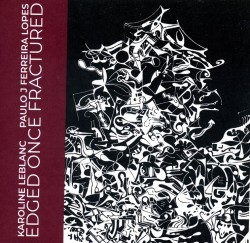 Another variation on these transformations mutates keyboard impulses to such an extent that they almost negate expected piano-like tones. Instead, output becomes that of an isolated modulation source. That’s what Montreal’s Karoline LeBlanc does on Edge Once Fractured (Arito-afeito 013 karolineleblanc.bandcamp.com/album/edged-once-fractured) as she extracts improvised timbres from a piano, pipe organ and harpsichord. These sonorities are blended with other pulses she sources from wood rattles, a seashell horn, a bulbul tarang (14-string Indian banjo) and taal or miniature clash cymbals. When further melded with anomalous tones from Paulo J Ferreira Lopes’ gongs, tin plates, springs, cymbals and bells, the result is a sound collage, which makes up the single 32-minute track of this session. Although the only identifiable piano pattern is audible in the penultimate minutes before knife-like string echoes and spring whammies conclude the piece, occasional tremolo pipe organ resonations and the noises of metal objects quivering on inner keyboard strings are more common. Emphasising string strums and key-stopping, her brighter contributions, and an occasional silent interlude, set up contrapuntal challenges to Lopes’ timed vibrations. Consisting in equal parts of tin plate reverberations, gong and bell pealing, spring ricochets and serrated metal tones plus an occasional horn blast or sharp whistle, the subsequent echoing tones create an idiosyncratic narrative that taken as a whole is as flexible as it’s fluid.
Another variation on these transformations mutates keyboard impulses to such an extent that they almost negate expected piano-like tones. Instead, output becomes that of an isolated modulation source. That’s what Montreal’s Karoline LeBlanc does on Edge Once Fractured (Arito-afeito 013 karolineleblanc.bandcamp.com/album/edged-once-fractured) as she extracts improvised timbres from a piano, pipe organ and harpsichord. These sonorities are blended with other pulses she sources from wood rattles, a seashell horn, a bulbul tarang (14-string Indian banjo) and taal or miniature clash cymbals. When further melded with anomalous tones from Paulo J Ferreira Lopes’ gongs, tin plates, springs, cymbals and bells, the result is a sound collage, which makes up the single 32-minute track of this session. Although the only identifiable piano pattern is audible in the penultimate minutes before knife-like string echoes and spring whammies conclude the piece, occasional tremolo pipe organ resonations and the noises of metal objects quivering on inner keyboard strings are more common. Emphasising string strums and key-stopping, her brighter contributions, and an occasional silent interlude, set up contrapuntal challenges to Lopes’ timed vibrations. Consisting in equal parts of tin plate reverberations, gong and bell pealing, spring ricochets and serrated metal tones plus an occasional horn blast or sharp whistle, the subsequent echoing tones create an idiosyncratic narrative that taken as a whole is as flexible as it’s fluid.
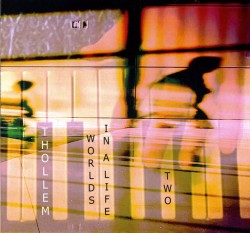 American keyboardist Thollem performs a similar keyboard reconstitution on Worlds in a Life 2 (ESP 5071 espdisk.com/thollem). But he does so during nine tracks using his Wavestate or sequencing synthesizer to mutate recorded samples of music he made on piano and organ alongside Pauline Oliveros’ MIDI accordion, Nels Cline’s guitar and effects, William Parker’s double bass, Michael Wimberly’s drums and Terry Riley’s vocals. The resulting shuffled and reconstructed timbral palette masks individual contributions. But the crucial development is how synthesizer and keyboards mulch, meld and modify textures into a comprehensive whole. Orchestrating instrumental motifs with a steady hand, Thollem negotiates unexpected amalgamation by juxtaposing congruent sound paths that ordinarily wouldn’t be followed. Simultaneously programmed electronics create a palimpsest of layered instrumental output that constantly judders. Visions Cells is a descriptive instance of this as the looped enhanced strings plink and twang as if part of a giant mechanized zither. Vibrating below are asides ranging from marimba-like resonations to pedal point piano pressure. Prestissimo pitches created from accordion samples seep all over Conversations On The Way’s introduction. Yet metallic cymbal stings create a cadenced response, with the mid section reconfiguration into a near-acoustic duet of drum paradiddles and methodical piano cascades. Additionally, vocal interpolations on tracks like Tongues We Think In and Chagudah don’t operate in isolation. During the second piece, yodeling timbral gymnastics and Donald Duck-like cries are flanged and submerged beneath watery gurgles. As for Tongues We Think In, the hocketed syllables and melisma are looped into a multi-voice choir as synthesized oscillations and percussion shuffles evolve beside it.
American keyboardist Thollem performs a similar keyboard reconstitution on Worlds in a Life 2 (ESP 5071 espdisk.com/thollem). But he does so during nine tracks using his Wavestate or sequencing synthesizer to mutate recorded samples of music he made on piano and organ alongside Pauline Oliveros’ MIDI accordion, Nels Cline’s guitar and effects, William Parker’s double bass, Michael Wimberly’s drums and Terry Riley’s vocals. The resulting shuffled and reconstructed timbral palette masks individual contributions. But the crucial development is how synthesizer and keyboards mulch, meld and modify textures into a comprehensive whole. Orchestrating instrumental motifs with a steady hand, Thollem negotiates unexpected amalgamation by juxtaposing congruent sound paths that ordinarily wouldn’t be followed. Simultaneously programmed electronics create a palimpsest of layered instrumental output that constantly judders. Visions Cells is a descriptive instance of this as the looped enhanced strings plink and twang as if part of a giant mechanized zither. Vibrating below are asides ranging from marimba-like resonations to pedal point piano pressure. Prestissimo pitches created from accordion samples seep all over Conversations On The Way’s introduction. Yet metallic cymbal stings create a cadenced response, with the mid section reconfiguration into a near-acoustic duet of drum paradiddles and methodical piano cascades. Additionally, vocal interpolations on tracks like Tongues We Think In and Chagudah don’t operate in isolation. During the second piece, yodeling timbral gymnastics and Donald Duck-like cries are flanged and submerged beneath watery gurgles. As for Tongues We Think In, the hocketed syllables and melisma are looped into a multi-voice choir as synthesized oscillations and percussion shuffles evolve beside it.
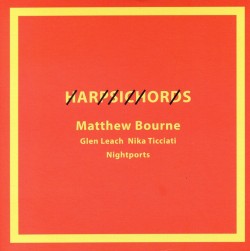 In spite of these modern advances another method to create a unique keyboard program is to go back to the future. That’s exactly what UK musician Matthew Bourne has done on Harpsichords (DISCUS 175 CD discusmusic.bandcamp.com/album/harpsichords-175cd-2024). Given three harpsichords in serious disrepair by the Leeds Conservatory he used the disintegrating facilities of this piano ancestor to generate idiosyncratic improvisations. On one disc of this two-CD set he, Glen Leach and Nika Ticciati form a sonic group grope playing simultaneously on all three decaying harpsichords. Elsewhere Bourne improvises alone on a single harpsichord. Adding the future to the past, his creative keyboard excursions are matched with live electronics and processing from Matthew Slater and Adam Martin. The fascination of the first disc is hearing how these experienced keyboardists push their disintegrating instruments away from overriding cacophony to reveal melodic interludes at high and low pitches. Making the best use of the decaying mechanism echoing, percussion-like crashes and string glissandi are highlights. On his own, Bourne deals with variations of this concept, but takes advantage of live processing to extend his initial timbres further in tempo and pitch and also provides an oscillating landscape of distended and fragmented tones. Capable of producing a pitch-perfect so-called classical harpsichord sequence as he demonstrates a couple of times, Bourne uses the instrument’s corrosion to spawn jangling patterns and pitches, then on tracks such as John and Brown Bins triggers the plectrum on the strings to nearly replicate what would be expected from a 12-string guitar. With forearm smashes and keyboard rebounds on Red Brick he evokes doorstopper-like strums as well. However, the electronic additions mean that on tracks like that one and others, processing projects a secondary keyboard sound in tandem with his live playing, Establishing the versatility of even a crumbling instrument like this one, Bourne confirms the keyboard’s traditional sound as well as its potential for distinct experimentation.
In spite of these modern advances another method to create a unique keyboard program is to go back to the future. That’s exactly what UK musician Matthew Bourne has done on Harpsichords (DISCUS 175 CD discusmusic.bandcamp.com/album/harpsichords-175cd-2024). Given three harpsichords in serious disrepair by the Leeds Conservatory he used the disintegrating facilities of this piano ancestor to generate idiosyncratic improvisations. On one disc of this two-CD set he, Glen Leach and Nika Ticciati form a sonic group grope playing simultaneously on all three decaying harpsichords. Elsewhere Bourne improvises alone on a single harpsichord. Adding the future to the past, his creative keyboard excursions are matched with live electronics and processing from Matthew Slater and Adam Martin. The fascination of the first disc is hearing how these experienced keyboardists push their disintegrating instruments away from overriding cacophony to reveal melodic interludes at high and low pitches. Making the best use of the decaying mechanism echoing, percussion-like crashes and string glissandi are highlights. On his own, Bourne deals with variations of this concept, but takes advantage of live processing to extend his initial timbres further in tempo and pitch and also provides an oscillating landscape of distended and fragmented tones. Capable of producing a pitch-perfect so-called classical harpsichord sequence as he demonstrates a couple of times, Bourne uses the instrument’s corrosion to spawn jangling patterns and pitches, then on tracks such as John and Brown Bins triggers the plectrum on the strings to nearly replicate what would be expected from a 12-string guitar. With forearm smashes and keyboard rebounds on Red Brick he evokes doorstopper-like strums as well. However, the electronic additions mean that on tracks like that one and others, processing projects a secondary keyboard sound in tandem with his live playing, Establishing the versatility of even a crumbling instrument like this one, Bourne confirms the keyboard’s traditional sound as well as its potential for distinct experimentation.
In the right hands – or is it fingers? – keyboard solos can follow all sorts of unexpected avenues of which these are just a few.
 Colin Fisher – Suns of the Heart
Colin Fisher – Suns of the Heart










